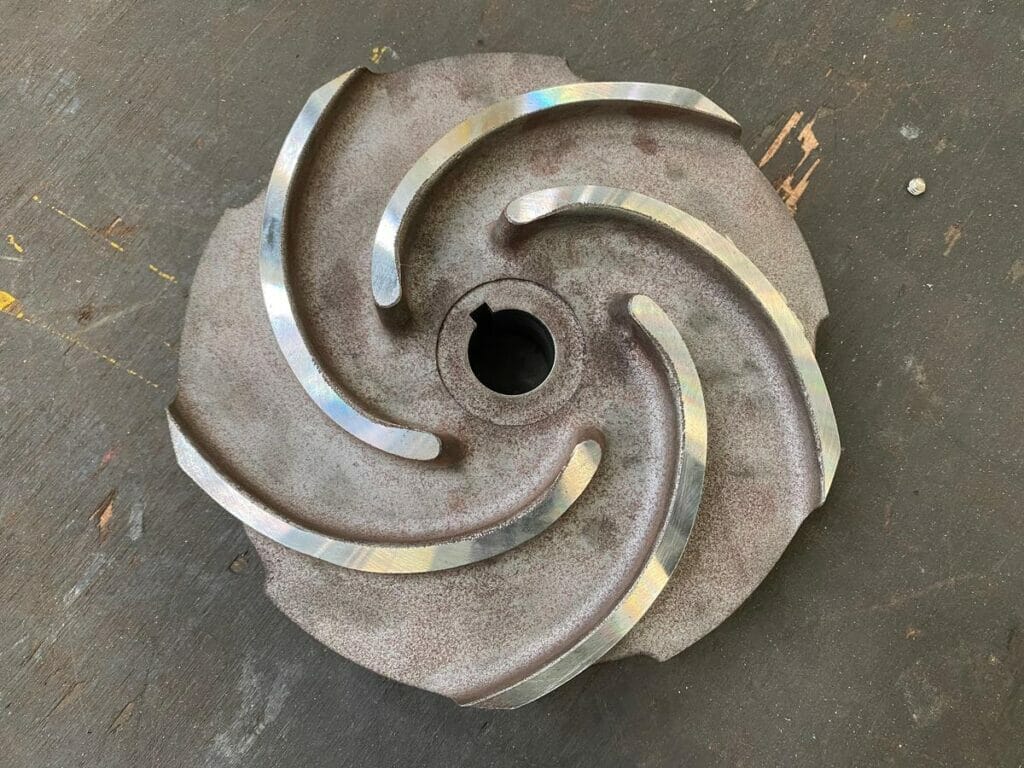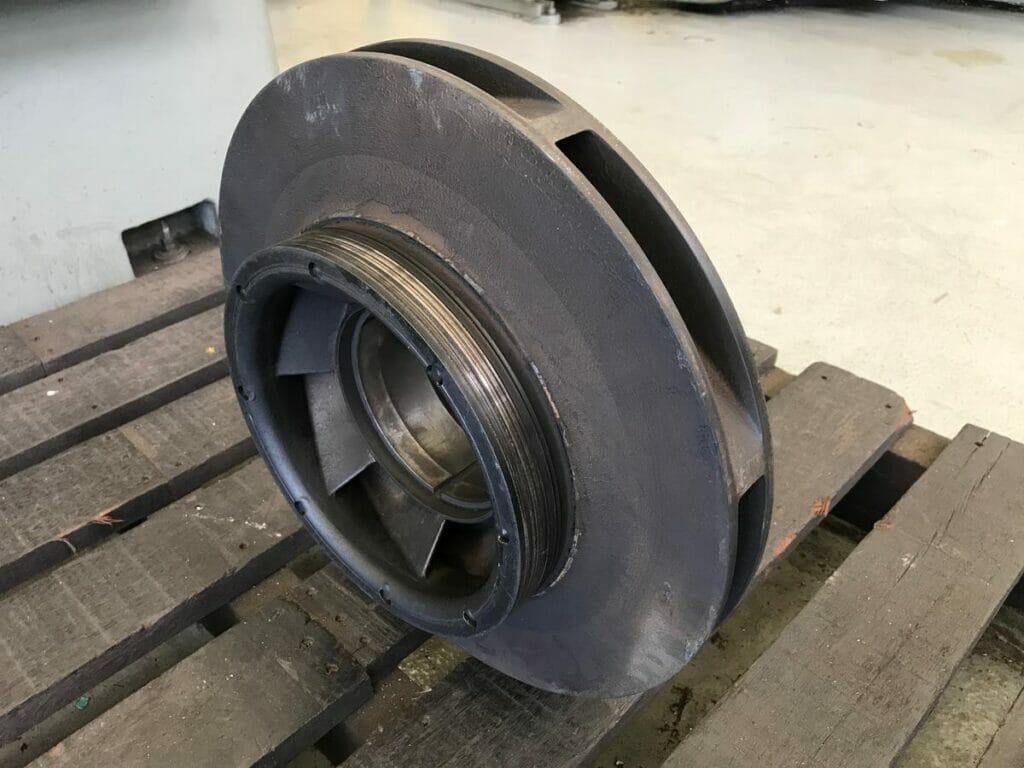Have you ever wondered about the different types of impellers used in pumps? Understanding the difference between open, semi-open, and closed impellers is crucial for selecting the right pump for your application.
In this blog post, we’ll explore the unique characteristics of each impeller type, helping you make an informed decision and optimize your pumping system’s performance.
What is Open Impellers
Open impellers are a type of impeller design used in centrifugal pumps. They consist of a series of vanes attached to a central hub, with the vanes exposed on both sides. This open design allows for easy access to the impeller for cleaning and maintenance purposes.
Open impellers are particularly well-suited for handling fluids that contain solids or are highly viscous. The open design reduces the risk of clogging and allows for more efficient pumping of these types of fluids. Additionally, open impellers offer a wide range of specific speeds, making them adaptable to various pumping applications.

Advantages of Open Impellers
- Easier to clean and maintain: The exposed vanes allow quick and thorough cleaning, reducing contamination risk and ensuring optimal performance.
- Better for handling solids and viscous fluids: The open design allows larger passages between the vanes, reducing clogging and enabling more efficient pumping.
- Wide range of specific speeds: Open impellers offer a wide range of specific speeds, making them suitable for various pumping applications.
Disadvantages of Open Impellers
- Lower efficiency compared to closed impellers: Open impellers have increased fluid recirculation, leading to reduced pumping efficiency, higher energy consumption, and increased operating costs.
- More susceptible to wear and damage: The exposed design makes open impellers more prone to erosion and deterioration from abrasive or corrosive fluids, resulting in reduced performance and higher maintenance needs.
Applications of Open Impellers
- Wastewater treatment: Ideal for pumping wastewater with solids and debris due to reduced clogging risk.
- Food and beverage processing: Ensures easy cleaning and maintenance, maintaining hygiene in the pumping process.
- Chemical processing: Efficiently handles viscous chemicals and slurries with its open design.
- Mining and mineral processing: Suitable for abrasive slurries, making it popular in mining applications.
- Agricultural irrigation: Pumps water with debris and solids, ensuring reliable operation in irrigation systems.
What is a Semi-Open Impeller
A semi-open impeller is a type of impeller design that combines features of both open and closed impellers. It consists of vanes attached to a back shroud, with the front side of the vanes remaining open. This design allows for a balance between the advantages and disadvantages of fully open and closed impeller designs.

Advantages of Semi-Open Impellers
- Balance between open and closed designs: Semi-open impellers offer better efficiency than open impellers while still handling some solids and viscous fluids.
- Can handle some solids and viscous fluids: The open front side of the vanes allows for the passage of some solids and viscous fluids, making them suitable for fluids with moderate suspended particles or higher viscosity.
- Adjustable for wear to maintain performance: Semi-open impellers can be adjusted to compensate for wear from abrasive fluids or solids, ensuring optimal performance over time by maintaining the desired clearance between the impeller and casing.
Disadvantages of Semi-Open Impellers
- Reduced efficiency compared to closed impellers: Semi-open impellers have lower efficiency than closed impellers due to fluid recirculation and leakage from the open front side of the vanes.
- Potential for irregular flow and leakage: The open front side of the vanes can cause irregular flow patterns and leakage, leading to increased turbulence, vibration, noise, and reduced pumping performance.
Applications of Semi-Open Impellers
- Wastewater treatment: Used in pumps handling sewage and wastewater with small solids or fibrous materials.
- Food and beverage processing: Suitable for viscous fluids like syrups, sauces, and slurries, balancing fluid handling and efficiency.
- Chemical processing: Handles chemicals with moderate viscosities or small suspended solids.
- Agricultural irrigation: Used in irrigation systems where water may contain small amounts of sand, silt, or debris.
- Mining and mineral processing: Employed in pumps handling slurries and process water with abrasive particles.
What is Closed Impellers
A closed impeller is a type of impeller design used in centrifugal pumps. It features a set of vanes that are enclosed by shrouds on both sides, creating a series of discrete passages. The fluid enters the impeller eye and is directed through these passages, where it gains velocity and pressure before being discharged into the pump casing.
Advantages of Closed Impellers

- Highest efficiency among the three types: Closed impellers are the most efficient, minimizing fluid recirculation and leakage to ensure maximum energy transfer.
- Ideal for clean fluids and high-pressure applications: Best for clean fluids without suspended solids and high-pressure environments, as the shrouds provide structural support.
- Less prone to clogging and wear: Protected vanes make closed impellers less likely to clog or wear, leading to longer life and reduced maintenance.
Disadvantages of Closed Impellers
- Difficult to clean if clogged: If a closed impeller becomes clogged, accessing and cleaning the passages can be challenging. This may require disassembling the pump, leading to increased downtime and maintenance costs.
- Not suitable for fluids with solids: Closed impellers are not recommended for handling fluids with suspended solids or abrasive particles. The narrow passages can easily become blocked, reducing performance and potentially damaging the impeller.
- Higher manufacturing costs: The complex design and precise tolerances required for closed impellers make them more expensive to manufacture compared to semi-open or open impellers. This can impact the overall cost of the pump system.
Applications of Closed Impellers
- Water supply and distribution systems
- Boiler feed pumps in power plants
- High-pressure cleaning equipment
- Reverse osmosis and ultrafiltration systems
- Petroleum refining and petrochemical processing
- Hydraulic systems and machine tool coolant pumps
Factors to Consider When Selecting an Impeller Type
When choosing between open, semi-open, and closed impellers, several factors should be taken into account to ensure optimal performance and efficiency. The following considerations can help guide the decision-making process:
Application Requirements
The specific requirements of the application, such as flow rate, pressure, and fluid properties, play a crucial role in determining the most suitable impeller type. Open impellers are generally more suitable for handling fluids with suspended solids or high viscosity, while closed impellers are better suited for clean liquids and applications requiring higher efficiency.
Efficiency
Closed impellers typically offer higher efficiency compared to open and semi-open designs. The enclosed vanes minimize fluid recirculation and reduce hydraulic losses, resulting in improved pump performance. However, the efficiency gains may be offset by the increased manufacturing costs associated with closed impellers.
Maintenance and Cleaning
Open impellers provide easier access for maintenance and cleaning purposes. The exposed vanes allow for quick inspection and removal of any debris or build-up. In contrast, closed impellers require more disassembly for thorough cleaning, which can be time-consuming and increase maintenance costs.
Clogging and Solids Handling
Applications involving fluids with suspended solids or stringy materials may benefit from open or semi-open impellers. The larger passages between the vanes reduce the risk of clogging and allow for better handling of solids. Closed impellers, with their narrow passages, are more susceptible to clogging in such environments.
Cost Considerations
Open impellers are generally less expensive to manufacture compared to closed impellers due to their simpler design and fewer components. Semi-open impellers fall in between, offering a balance between cost and performance. The initial cost savings of open impellers should be weighed against the potential long-term efficiency gains of closed impellers.
Durability and Wear Resistance
The durability and wear resistance of the impeller material should be considered based on the fluid properties and operating conditions. Open impellers may be more susceptible to wear due to the exposed vanes, especially in abrasive environments. Closed impellers, with their enclosed design, can offer better protection against wear and extend the impeller’s lifespan.
In conclusion
Understanding the differences between open, semi-open, and closed impellers is crucial for selecting the right pump for your application. Consider factors such as viscosity, solids handling, and efficiency when making your choice.
Need help finding the perfect impeller for your needs? Contact our expert team today.

